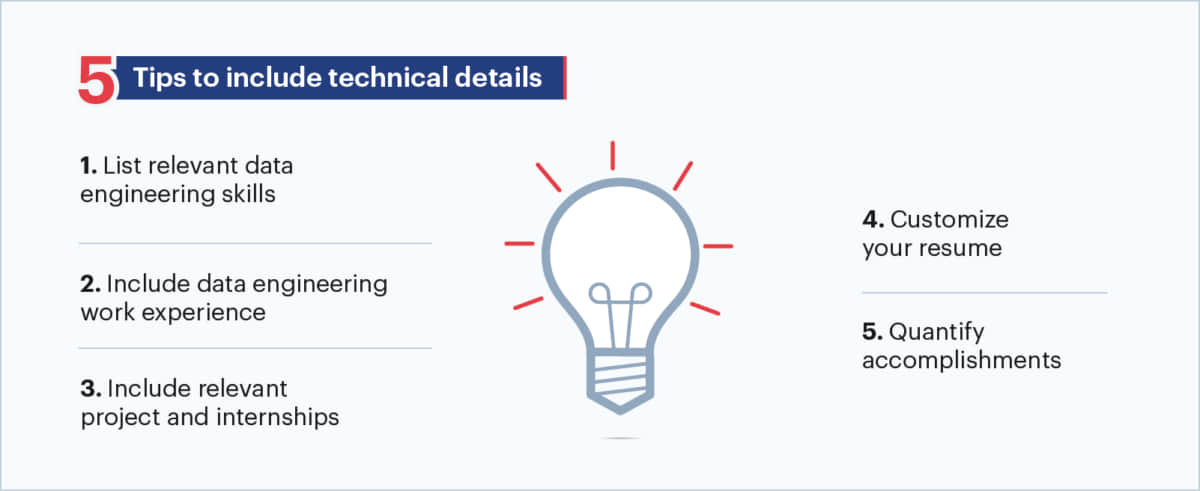5 tips for preparing resume for a Data Engineering interview
Reading Time: 5 minutes

Data engineering is a highly specialized field. From distributed computing to building data pipelines, data engineering requires multidisciplinary skills. The term data engineer is often used interchangeably with data scientists and software engineers. While some tasks overlap with these profiles, the approach and processes involved in data engineering job roles differ significantly.
Both software engineers and data engineers heavily rely on programming languages, however, software engineers have limited exposure to data infrastructure. Data engineers, however, deal with maintaining large datasets, build systems to store them, consolidate and retrieve data. They are crucial to amplifying the business value of advanced analytics. Similarly, data engineers are often compared with data scientists who are majorly tasked with analyzing, testing, aggregating, and optimizing data. Data scientists usually process the data and generate insights.
Data engineers should pose skills such as understanding big data tools, designing big data infrastructure, building and optimizing data pipelines from the ground up, optimizing data delivery, programming languages, and more. They are required to have an understanding of ETL, ELT, databases such as SQL, data warehousing, metadata management, and cloud.
Data engineers are high in demand, and appearing for data engineering interviews is becoming increasingly competitive. The interview process can involve many steps such as several technical rounds and solving actual case studies and problem statements. It is crucial to make a good first impression, and therefore, it is important to have a unique resume that stands out. However, creating a resume that emphasizes your depth of data engineering experience while keeping it concise can be overwhelming.
This article covers a few important tips that you can keep in mind while creating a resume for data engineering interviews.
Tips to include technical details:

- List relevant data engineering skills
As mentioned before, data engineering is often used interchangeably with software engineering, data scientists, analysts, and more. The first step to keep in mind would be to include relevant skills and experiences that define you for data engineering roles. Some skills that you should include are:
- Programming languages (Python, Java, C, R, etc.)
- Big data tools (Hadoop, Spark, Kafka, Sqoop, Flume, Apache Flink, Nifi, Pig, Hive)
- Database (SQL, NoSQL, MongoDB)
- Cloud computing (AWS, GCP)
- Data warehouse (Amazon Redshift, Azure, SnowFlake)
- ETL process
- Building data pipelines
- Data APIs, and more
- Include data engineering work experience
Apart from listing tools, it is also important to showcase the relevant work that you have done in data engineering. It can include a few tools and methodologies you have worked on, key challenges you resolved, and the end results. Typical work experiences required for data engineering roles are:
- Using agile methodologies to manage projects
- End-to-end implementation of big data solutions on cloud environments such as Cloudera
- Distributed computing using ETL/ELT
- Data modeling
- Experience with database development, and more
- Include relevant project and internships
Those who do not have years of experience in data engineering can include relevant projects and internship experience. You should include the company name, designation, duration of the internship while focusing on the tools and frameworks that you worked with. For instance, designed and developed complex data pipelines, worked with data pipeline ETLs, etc.
- Customize your resume
With numerous job applications and resumes that employers have to go through, you may have a high probability of getting noticed if your resume offers what they are looking for. Customization of resume according to the job description can be a huge differentiating factor. It doesn’t mean re-writing the resume but making minor tweaks according to the job profile. For instance, highlighting points such as extensive knowledge of ETL tools, basic Unix administration, and others based on the job description. You can also focus on keywords mentioned in the job description. If the job opening mentions that they are looking for experience in SQL/MPP databases, be sure to list it as a skill.
- Quantify accomplishments
Numbers always have a greater impact than plain sentences. It is therefore ideal to quantify your results and accomplishments wherever possible. For instance, writing “Built a recommendation system that helped increase revenue by 20% and improve customer engagement by 10%” creates more impact than writing “Built a recommendation system that created a significant increase in revenue”.
Other important tips to keep in mind:
Link your social and work profiles
An important tip that often gets overlooked is adding links to your social profiles such as LinkedIn, GitHub, Kaggle, and more. It is also important to keep them updated. For instance, the LinkedIn profile can have recommendations from managers and colleagues, a GitHub profile can highlight your recent projects, exposure to data engineering skills, and more.
Use bullet points
This is an important tip to keep in mind. Whether it is listing your work experience, profile, project experience, education, skills, or tools, list everything in bullets. Reading a whole para can be quite overwhelming for a recruiter than giving a quick glance at bullets and highlights. Keeping the resume simple and readable can give you that extra edge. It is also advisable to keep it 1-2 pages.
Consistency and formatting
It is ideal to share a resume in PDF format, however, the word format is also popular. The advantage of sharing PDF files is that formatting is preserved and there is no misalignment in text and other elements. It is also important that the resume has a consistent format of titles, subtitles, bullet points, fonts, spacing, and more. The resume should be clear and readable for the recruiters.
Avoid typos
Always proofread your resume thoroughly to check for any typographical and grammatical errors. Your resume should direct the recruiters toward your skills and not errors.
Good luck preparing your resume for the next data engineering interview!
Featured blogs
Subscribe to get latest insights
Talk to our experts
Get the best ROI with Sigmoid’s services in data engineering and AI
Featured blogs
Talk to our experts
Get the best ROI with Sigmoid’s services in data engineering and AI






